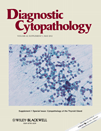
DIAGNOSTIC CYTOPATHOLOGY
Scope & Guideline
Navigating the Complexities of Disease through Cytopathology
Introduction
Aims and Scopes
- Cytological Diagnosis of Tumors:
The journal emphasizes research on the cytological diagnosis of various tumors, focusing on methodologies like fine-needle aspiration (FNA) and the use of ancillary techniques such as immunocytochemistry and molecular testing to improve diagnostic accuracy. - Diagnostic Challenges and Pitfalls:
A core area of focus is the identification and exploration of diagnostic challenges and pitfalls in cytopathology, providing insights into common misdiagnoses and strategies to mitigate these issues. - Advancements in Cytopathological Techniques:
The journal highlights advancements in cytopathological techniques including liquid-based cytology, digital pathology, and next-generation sequencing, showcasing their implications for diagnostic practices. - Clinical Applications and Outcomes:
Research often includes clinical applications of cytopathology in various settings, assessing the impact of cytological findings on patient management and outcomes. - Interobserver Variability and Standardization:
The journal addresses the importance of standardization in cytopathology reporting systems such as the Milan system and the Papanicolaou Society guidelines, focusing on interobserver variability and reproducibility of diagnoses.
Trending and Emerging
- Molecular Diagnostics in Cytology:
There is a marked increase in research focusing on the integration of molecular diagnostics, including next-generation sequencing and targeted mutation analysis, which enhances the diagnostic capabilities and prognostic insights of cytological specimens. - Digital Pathology and Artificial Intelligence:
Emerging themes include the application of digital pathology and artificial intelligence for cytological analysis, reflecting a trend towards automation and improved diagnostic accuracy through computational methods. - Personalized Medicine and Biomarker Testing:
A growing interest in personalized medicine is evident, with studies focusing on biomarker testing in cytological specimens to guide targeted therapies, particularly in oncology. - Cytology in Rare Tumors and Uncommon Presentations:
There is an increasing number of publications addressing the cytological diagnosis of rare tumors and atypical presentations, showcasing the journal's role in highlighting complex cases that challenge conventional diagnostic paradigms. - Cytopathology in Infectious Diseases:
The journal is witnessing a rise in research related to the role of cytopathology in diagnosing infectious diseases, particularly in the context of the COVID-19 pandemic and its implications for cytological practice.
Declining or Waning
- Traditional Cytology Techniques:
There appears to be a decline in publications focused solely on traditional cytology techniques without integration of advanced methods (e.g., molecular diagnostics), as the field increasingly moves towards more integrated and comprehensive diagnostic approaches. - Cytology in Non-oncological Conditions:
Research on cytological applications in non-oncological conditions has decreased, indicating a shift in focus towards oncological applications and tumor diagnostics. - Basic Cytological Methods:
Papers solely discussing basic cytological methods without innovative applications or advancements are less frequent, suggesting a transition towards more complex and technologically integrated methodologies. - Cytology Education and Training:
While educational content remains important, there seems to be a reduction in publications dedicated to basic education and training in cytopathology, as the community seeks more advanced and specialized training opportunities.
Similar Journals

ANNALS OF CLINICAL BIOCHEMISTRY
Advancing the Frontiers of Clinical Biochemistry.The Annals of Clinical Biochemistry, published by SAGE Publications Inc, is a prestigious journal that has been pivotal in advancing the field of clinical biochemistry since its inception. With an ISSN of 0004-5632 and an E-ISSN of 1758-1001, this journal provides a platform for high-quality, peer-reviewed research articles, reviews, and case studies that cover a wide range of topics, including biochemical analysis, diagnostic methodologies, and the latest advancements in clinical practices. As a recognized leader in the field, it holds a Q2 ranking in both Clinical Biochemistry and Miscellaneous Medicine categories, showcasing its contribution to the evolving landscape of medical science. The journal’s impact is further underscored by its strategic emphasis on fostering collaboration between researchers and healthcare professionals. Although it does not provide Open Access options, the accessible subscription model ensures that vital research remains within reach of academic and clinical institutions. The Annals of Clinical Biochemistry aims to promote the understanding and application of biochemical techniques in clinical settings, ensuring it remains an essential resource for researchers, professionals, and students alike.

Cardiogenetics
Bridging genetics and cardiology for better patient outcomes.Cardiogenetics, published by MDPI, is a leading open-access journal dedicated to advancing the field of genetics as it pertains to cardiovascular health and diseases. Since its launch in 2011, this journal has been at the forefront of disseminating high-quality research that explores the genetic underpinnings of cardiovascular conditions, offering a platform for innovative studies, reviews, and case reports. With an ISSN of 2035-8253 and an E-ISSN of 2035-8148, Cardiogenetics aims to bridge the gap between genetic research and clinical application, helping researchers, healthcare professionals, and students stay abreast of the latest advancements and findings. The journal’s commitment to open access ensures that its valuable content is available to a global audience, fostering greater collaboration and knowledge sharing in the cardiovascular genetics community. By contributing to this dynamic field, Cardiogenetics plays a crucial role in improving patient outcomes and paving the way for personalized medicine in cardiology.
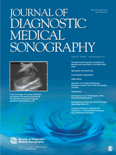
JOURNAL OF DIAGNOSTIC MEDICAL SONOGRAPHY
Inspiring Progress in Radiological TechnologyJOURNAL OF DIAGNOSTIC MEDICAL SONOGRAPHY, published by SAGE PUBLICATIONS INC, is a critical platform for researchers, clinicians, and students in the field of sonography, offering insights and advancements in diagnostic imaging practices since its inception in 1985. With ISSN 8756-4793 and E-ISSN 1552-5430, this journal serves as a comprehensive resource addressing the latest trends, techniques, and technologies in radiological and ultrasound practices, despite being indexed in the lower quartiles yet maintaining a niche audience passionate about the evolution of sonographic methodologies. The journal's ongoing commitment to publishing high-quality research contributes significantly to its ranking within the competitive spheres of Radiology, Nuclear Medicine and Imaging and Radiological and Ultrasound Technology. As the field evolves, this journal aims to inspire dialogue, promote evidence-based practices, and enhance education among professionals dedicated to improving diagnostic accuracy and patient care in ultrasound technology.

ACTA CYTOLOGICA
Bridging Cellular Biology and Medical InnovationACTA CYTOLOGICA is a premier journal dedicated to the field of cytology, offering a platform for researchers, professionals, and students interested in the intricate study of cellular biology and its applications in the medical domain. Published by KARGER in Switzerland, the journal has been a vital resource since its inception in 1960 and is recognized for its rigorous peer-reviewed articles. With a notable impact factor reflecting its significance—ranked in the Q2 category in both Medicine (miscellaneous) and Pathology and Forensic Medicine, and Q3 in Histology for 2023—ACTA CYTOLOGICA continues to contribute valuable insights into cytological research and its implications for clinical practice. The journal maintains an annual focus on cutting-edge studies and reviews that enhance understanding and methodological advancements in cytology. Although it does not provide open access, it remains an essential read for those involved in histology and pathology, promising to keep them abreast of the latest findings and technological innovations in the field.

Acta Radiologica Open
Empowering global collaboration in radiological science.Acta Radiologica Open is an esteemed open-access journal published by SAGE Publications Ltd, dedicated to advancing the field of radiology. Since its inception in 2012, the journal has been a vital platform for researchers, professionals, and students to disseminate and access high-quality, peer-reviewed research in radiological science. With a focus on innovative imaging techniques, clinical advancements, and interdisciplinary approaches, Acta Radiologica Open plays a crucial role in bridging the gap between theoretical knowledge and practical application. The journal contributes significantly to the body of literature by promoting open science and facilitating global collaboration among researchers. Readers can readily access a diverse range of articles that not only highlight emerging trends but also address key challenges in the field, making it an indispensable resource for anyone involved in radiological research and practice.
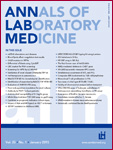
Annals of Laboratory Medicine
Innovating Diagnostics for a Healthier TomorrowAnnals of Laboratory Medicine, published by the KOREAN SOC LABORATORY MEDICINE, stands as a pivotal resource for researchers and practitioners in the fields of clinical and medical biochemistry. With a strong Q2 ranking in both Biochemistry (medical) and Clinical Biochemistry, along with a prestigious Q1 status in miscellaneous Medicine categories, this journal emphasizes the significance of laboratory medicine in improving patient outcomes and advancing scientific understanding. Established in 2012, the journal has demonstrated an impressive trajectory of growth and scholarly contribution, making it a reliable source of high-quality research and insightful reviews. The journal utilizes open access, enhancing the reach of its findings across the global scientific community. Operating from South Korea, Annals of Laboratory Medicine aims to foster dialogue and collaboration among professionals, contributing to the continuous advancement of laboratory methodologies and diagnostics.
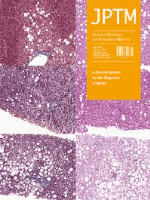
Journal of Pathology and Translational Medicine
Championing Open Access in Pathology ResearchThe Journal of Pathology and Translational Medicine, published by the Korean Society of Pathologists, is a distinguished peer-reviewed Open Access journal that has been at the forefront of advancing the field of pathology and histology since its inception in 1985. With an established ISSN of 2383-7837 and an E-ISSN of 2383-7845, the journal serves as a vital platform for disseminating high-quality research, fostering collaboration among professionals and offering valuable insights into both clinical applications and theoretical advancements. Recognized for its influence in the field, it holds a commendable Q2 ranking in both Histology and Pathology & Forensic Medicine categories in 2023, and ranks #52/208 in Scopus for Medicine – Pathology and Forensic Medicine, demonstrating its impact and reach within the academic community. Located in South Korea at 1209 Gwanghwamun Officia, 92 Saemunan-ro, Jongno-gu, Seoul 03186, this journal not only caters to researchers and professionals but also supports students striving to deepen their understanding of pathology. Join the growing body of knowledge and stay updated with the latest findings in this essential field of study through the journal's open access format, promoting worldwide accessibility and engagement.
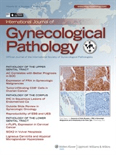
INTERNATIONAL JOURNAL OF GYNECOLOGICAL PATHOLOGY
Advancing knowledge in women's reproductive health.INTERNATIONAL JOURNAL OF GYNECOLOGICAL PATHOLOGY, published by Lippincott Williams & Wilkins, is a premier academic journal dedicated to the intricate field of gynecological pathology, serving a critical role in advancing the understanding of diseases related to women's reproductive health. Since its inception in 1982, this journal has established itself as a key resource for researchers, clinicians, and students, with a current impact factor that reflects its esteemed reputation; it is ranked in the Q2 category for both Obstetrics and Gynecology, as well as Pathology and Forensic Medicine, signifying its prominence in academic circles. The journal's scope encompasses a wide array of topics, including histopathological findings, diagnostic methodologies, and evolving therapeutic strategies, all pivotal to enhancing patient care. With a steadfast commitment to disseminating high-quality research until the projected year of 2024, the INTERNATIONAL JOURNAL OF GYNECOLOGICAL PATHOLOGY is an essential read for those looking to stay abreast of the latest developments in this vital area of medical science.
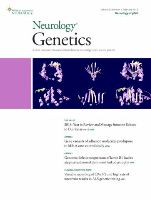
Neurology-Genetics
Pioneering Research at the Nexus of Neurology and Genetics.Neurology-Genetics, an esteemed journal published by LIPPINCOTT WILLIAMS & WILKINS, is at the forefront of advancing the fields of neurology and genetics. With a dedicated Open Access model since 2015, this journal ensures that cutting-edge research is readily available to researchers, professionals, and students worldwide. Operating from the United States, Neurology-Genetics has established a reputable position within the scientific community, as reflected by its impressive rankings in Scopus; it holds a Q1 ranking in clinical neurology and a Q2 ranking in clinical genetics, showcasing its dual commitment to these intertwined fields. With an impact factor that continues to grow alongside its reach, the journal encourages the dissemination of novel findings, innovative methodologies, and critical reviews that contribute to the understanding and treatment of neurological and genetic disorders. Researchers and practitioners are invited to engage with the latest discoveries and discussions, making Neurology-Genetics an essential resource for anyone involved in these dynamic areas of study.

JOURNAL OF CLINICAL PATHOLOGY
Connecting Evidence to Effective TreatmentJOURNAL OF CLINICAL PATHOLOGY, published by BMJ PUBLISHING GROUP, stands at the forefront of advancements in the field of clinical pathology, offering a platform for groundbreaking research and insights from 1948 to the present. With an impressive impact factor and categorized as Q1 in both Medicine (miscellaneous) and Pathology and Forensic Medicine for 2023, the journal holds a distinguished position in the academic community, ranking 22nd out of 208 journals in its category on Scopus and representing the 89th percentile. While the journal does not currently offer open access, it remains a vital resource for researchers, healthcare professionals, and students seeking to stay current with innovative methodologies, clinical techniques, and diagnostic advancements. Located in London, United Kingdom, the journal aims to bridge the gap between laboratory findings and clinical practice, emphasizing the importance of evidence-based pathology in improving patient care and treatment outcomes. Engage with the JOURNAL OF CLINICAL PATHOLOGY to enhance your understanding and contribute to the evolving landscape of clinical pathology research.